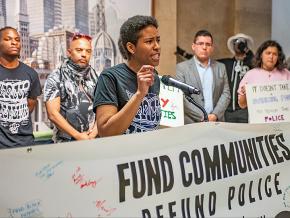Chicago finds millions for more cops
reports from Chicago on the protests that challenged a new police academy — and on why the City Council ignored the voices of the community.
THE CHICAGO City Council voted on May 25 to spend $95 million to build a new police academy in the city’s West Garfield Park neighborhood, despite a months-long campaign by community activists and students opposing the academy and demanding that the money be put to better use.
One survey of neighborhood residents by organizers with the group “No Cop Academy” found that 88 percent of West Garfield Park residents — 97 percent of whom are African American — think the construction of a new police academy isn’t a good use of the city’s resources.
Most those surveyed felt the money would be better spent on “community safety, schools, community spaces, mental health clinics, substance abuse clinics, homelessness, and reclaiming abandoned spaces,” according to the Chicago Tribune.

In March, students staged a die-in at City Hall to oppose the plan for the new police academy, carrying “gravestones” showing the names of Rekia Boyd, Laquan McDonald and many others who have been murdered by the Chicago police.
Also on the gravestones were the names of some of the neighborhood schools that have been closed by Mayor Rahm Emanuel and the city — underscoring the skewed priorities of the city government.
THE VOTE on the police academy was initially scheduled for May 23. With just one day’s notice, nearly 80 activists turned out for the City Council meeting that day to oppose the academy and demand police accountability.
Arriving two hours early, those opposed to the academy tried to ensure that we would have seats at the meeting. But the Fraternal Order of Police (FOP) also mobilized. Despite showing up late, the police were allowed to take all of the seats in the room, and activists against the academy were barred.
The FOP claims that Chicago Mayor Rahm Emanuel has “turned his back” on police because Emanuel supports a consent decree that would allow the federal government to oversee the process of police reform in the city, and because officers have been working without a contract for almost a year.
FOP Vice President Patrick Murray told the mayor at the meeting: “You are more concerned with consent decrees, settlements and pandering to police-hating groups than negotiating a contract with us.”
In reality, the FOP is opposed to any oversight and accountability. Before the meeting, some of the officers were chanting “Justice for Rialmo” — a reference to Robert Rialmo, the officer who shot and killed Quintonio LeGrier and Betty Jones, both unarmed, on their front porch in 2015.
Last December, the Civilian Office of Police Accountability ruled that the shooting of LeGrier and Jones was “not justified.” But three months later, Police Superintendent Eddie Johnson rejected this ruling and stated that Rialmo’s actions were “justified and within department policy.” Rialmo had a hearing that was closed to the public on May 22. Another hearing is scheduled for June 4.
Left-wing Alderman Carlos Ramirez-Rosa was able to postpone the vote on the police academy for two days on procedural grounds, giving those opposed to the academy a little more time to mobilize.
On May 25, activists once again turned out to oppose the police academy. Once again, most weren’t allowed into the meeting.
“We need our tax dollars to support our communities,” Maria Hernandez of Black Lives Matter Chicago told the Chicago Tribune before the vote. “You cannot stop crimes of survival without giving people a means to survive. That means jobs.”
The members of the City Council voted 39-2 in favor of the academy, including members of the City Council’s Black and Latino caucuses — populations disproportionately victimized by police. Ramirez-Rosa and Ricardo Munoz were the only dissenting votes, revealing the wide gap between city residents and the people who supposedly represent us in government.
In retaliation for his vote against the academy, Ramirez-Rosa — a member of the Democratic Socialists of America — was later informed that he had been expelled from the City Council’s Latino Caucus.
Social justice activists in Chicago have been working for years to promote independent political campaigns in an attempt to turn the City Council into something more than just a rubber stamp for the mayor and the city’s Democratic Party machine.
Ramirez-Rosa’s expulsion from the Latino Caucus shows us what an uphill battle we face, when even supposedly “progressive” politicians are so hostile toward dissent.
Regardless of what the FOP believes, a consent decree allowing Attorney General Jeff Sessions’ Justice Department to oversee supposed reforms of the Chicago Police Department will not prevent future abuse. Until there is genuine community control over the department — and many other reforms besides — Chicago police will continue to literally get away with murder.
Additionally, we need to build genuinely independent left-wing political power, so that the voices of ordinary people can’t simply be ignored — as they are now by the ones who make all the decisions.


